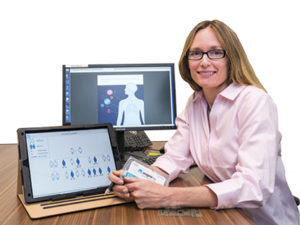Seeking Cancer Connections
You inherited your eye color from your mom and your hair color from your dad. Did one of them give you an elevated risk of cancer, too?
That question could now be answered through a new genetic counseling and testing service available at NorthBay Healthcare. Karen Vikstrom, who has more than 15 years of experience in genetic counseling, recently began offering this cutting-edge technology to at-risk patients through the NorthBay Cancer Center.
“What we know about genes and their connection to cancer has exploded in recent years,” Karen explained.

“The first breast cancer gene, called BRCA1, was identified in 1994 and we now know there are dozens of genes that potentially cause breast and other cancers. In those 5 percent to 10 percent of individuals diagnosed with cancer, there is an inherited factor that we can often identify, and this leads to better treatment and management.”
Previously, patients warranting genetic testing and counseling would have traveled to San Francisco or Sacramento, noted Teresa Langley, assistant vice president, Oncology and Neuroscience.
“Any NorthBay Healthcare physician—whether an oncologist, specialist or primary care physician—can refer a patient with certain red flags to Karen for a genetic risk evaluation,” Teresa said.
Red flags crop up when recording a patient’s medical and family history, Karen explained. For breast cancer, the three most common red flags are if a woman is diagnosed with breast cancer before age 50; if several members of the same generation have been diagnosed with breast cancer; or if it runs in several generations. Women with ovarian cancer at any age should also be evaluated.
“What we know about genes and their connection to cancer has exploded in recent years.”
Other red flags include a diagnosis of any cancer in anyone under age 50, or more than one type of cancer in the same person. A pattern of cancers may also be of concern, as researchers now know that some breast and ovarian cancer genes may also cause prostate and pancreatic cancer and melanoma. And a family history of colon cancers may point to another hereditary condition—Lynch Syndrome—a condition that increases the risk of cancers of the uterus, stomach, ovaries, small bowel, pancreas, urinary tract, kidney and bile ducts, and a slightly increased risk of prostate cancer.
Physicians who believe their patients would benefit from a genetic study can have the patient fill out a questionnaire that is then forwarded to Karen. If further investigation is warranted, the patient meets with Karen for a cancer risk assessment and she creates an even more detailed, three- to four-generation medical pedigree. If genetic testing is indicated, a saliva or blood sample is collected.
“It’s like detective work,” she explained. “I ask lots of questions about every individual in the family—those with cancer and those without.”
Test results are usually available in two to three weeks.
A patient can also be self-referred for a study, Karen explained. Genetic counseling may be covered by insurance if specific criteria are met.
Patient privacy is paramount and protected by law. The Genetic Information Nondiscrimination Act of 2008 (GINA) prevents employers and health insurance companies from using a person’s genetic information in employment or coverage decisions.
And, the results of the test are also protected under the Health Insurance Portability and Accountability Act (HIPAA) that requires providers, such as doctors, nurses, and hospitals, to keep your health information private.
“If we can identify people with higher-than-average cancer risks, we can implement a screening plan and hopefully prevent cancer or catch the disease early, when it is highly treatable,” she said.

